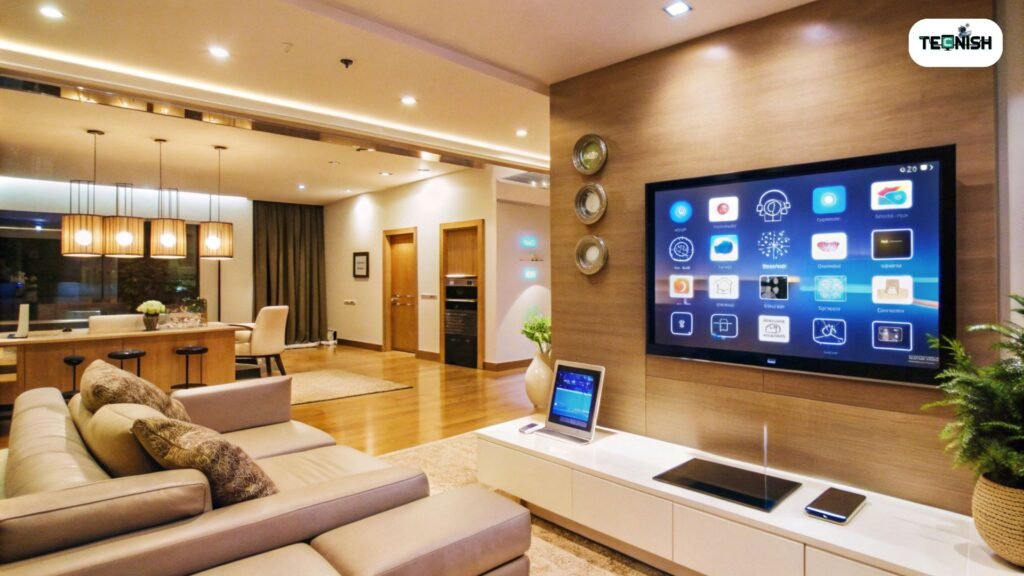Introduction
Have you ever dreamed of waking up in a home that automatically adjusts to your needs? Imagine a place where the lights brighten gently, the temperature is always perfect, and your coffee is brewing before you even get out of bed. What if your home could anticipate your every move, making life smoother, more comfortable, and more convenient? Well, this isn’t just a futuristic fantasy anymore smart home technology is here, and it’s already transforming the way we live. How smart home tech is shaping the future of living and How smart home technology will change lives is something that’s happening right now, changing how we interact with our homes in ways that once seemed impossible.
According to the SQ Magazine, 63%: Share of US households with at least one smart home device in 2025. From connected devices that make everyday tasks effortless to AI-powered systems that adapt to your preferences, this article will dive into how these innovations are reshaping modern living. Let’s explore how this technology is turning our homes into smart spaces that not only make our lives easier but also create a more sustainable and efficient way of living.
What is Smart Home Technology?

So, what exactly is smart home security and technology? To put it simply, it refers to devices and systems in your home that can be controlled remotely or set to work automatically. Think of things like smart lights that turn on when you walk into a room, thermostats that adjust to the perfect temperature before you arrive home, or security systems that you can check and control from your phone while you’re out.
These systems often use IoT in smart homes (Internet of Things) to communicate with each other and create a seamless, efficient home experience. AI (Artificial Intelligence) is another big part of this technology, allowing devices to learn and adapt to your preferences over time. Together, these technologies make up home automation systems that improve comfort, convenience, and energy efficiency.
The best part? You don’t need to be a tech expert to use them! With just a smartphone or voice commands, you can control everything from lighting to your refrigerator, making your home not just smarter, but easier to manage. The rise of connected home devices means you can automate your life in ways you never thought possible. If you’re curious about how these devices can change your life, check out our related article, How Smart Home Technology Will Change Lives, where we dive deeper into the potential of smart homes.
Benefits of Smart Home Tech for Modern Living
When we talk about how smart home tech is shaping the future of living, we’re really talking about how it can make life easier, safer, and more energy-efficient. Let’s break down some of the main benefits:
1. Convenience & Comfort
Imagine coming home after a long day, and the moment you walk through the door, your favorite playlist starts, the lights turn on to your preferred brightness.The temperature adjusts itself without you doing anything. This is the beauty of smart home security and technology. With devices like smart speakers and voice assistants such as Alexa or Google Assistant, you can control your home with simple voice commands, bringing an unmatched level of convenience to your daily life.
2. Energy Efficiency
We all want to reduce our carbon footprint and save on energy costs. With energy-efficient smart homes, this is possible. Smart thermostats learn your schedule, automatically adjusting heating and cooling systems to reduce energy use when you’re not around. Likewise, monster smart lighting systems can turn off when not in use, ensuring that no electricity is wasted. These energy-saving features contribute to more sustainable living and lower utility bills. Imagine a world where your home automatically takes care of your energy consumption, making it easier to be eco-friendly and efficient.
3. Security & Safety
One of the most important aspects of any home is safety, and smart home and security systems have made significant improvements in this area. From smart locks that allow you to lock and unlock doors remotely to security cameras that let you monitor your home while you’re away, smart technology offers peace of mind like never before. Motion sensors, doorbell cameras, and automated alerts are just a few of the ways smart home security systems keep your home safe.
If you’re looking to learn more about smart home security and how these technologies are evolving, be sure to check out on smart home & security for the latest updates and product recommendations.
4. Health & Wellness
Smart homes can even help improve your health and wellness. Devices like air quality monitors, sleep trackers, and smart beds help you maintain a healthier living environment. For example, smart devices can detect poor air quality and adjust ventilation to improve it, or they can track your sleep patterns and suggest adjustments for better rest. Personalized living with AI assistant in 2025 can even help your home adapt to your health needs, creating a more comfortable and health-conscious environment.
Popular Smart Home Devices in 2025

So, what are some of the smart home devices that are making waves in 2025? Here are some of the top gadgets that will shape how we live:
- Smart Speakers & Voice Assistants – Devices like Amazon Echo and Google Home are revolutionizing how we control our homes. With just a voice command, you can adjust the lights, play music, or control your smart thermostat.
- Smart Thermostats & Lighting – Automated lighting and thermostats can adjust themselves based on your preferences and schedule, saving you energy and keeping your home comfortable without manual input.
If you want to explore the latest in smart lighting technology, check out our Monster Smart Lighting Complete Guide in 2025.
- Smart Kitchen Appliances – In the kitchen, technology is becoming a game changer. From refrigerators that track groceries to ovens that can be controlled remotely, these devices bring convenience to your kitchen routine.
- Smart Security Systems & Cameras – These systems include cameras that you can check in on from anywhere, motion detectors, and even doorbell cameras that let you see who’s at the door and talk to them remotely.
All these devices work together in harmony as part of connected home devices, and with IoT in smart homes, the possibilities for integration are endless. If you want more deep information about this device you can check it on Tech Radar.
How Smart Homes Are Shaping the Future of Living
How smart home tech is shaping the future of living is not just about adding more gadgets to your house. It’s about creating a smarter, more efficient, and more personalized way of living. Here are some ways this technology is changing our lives:
- Personalized Living – Thanks to AI in smart home tech, your home can learn your routines and preferences over time, making adjustments to suit your lifestyle. For example, it could adjust the lighting based on the time of day or optimize your heating schedule to fit your daily habits.
- Seamless Integration – Imagine all your devices working together smoothly. Your lights, thermostat, security system, and even your refrigerator can communicate with each other, making your home more intuitive and easier to manage.
- Sustainability – Smart homes are at the forefront of reducing energy consumption and waste. From energy-efficient smart homes that automatically conserve power to devices that track your energy usage, this technology makes living sustainably easier and more accessible for everyone.
- Smart Cities – As cities get smarter, homes will be part of a larger interconnected ecosystem. Smart cities use the same technologies to manage resources like energy, water, and transportation more efficiently, making urban living more sustainable and convenient.
Challenges & Considerations
Of course, there are some challenges to consider when it comes to smart home technology. One of the main concerns is privacy and data security. Since these devices collect a lot of personal data, it’s crucial to ensure your systems are protected from hackers.
The cost of setting up a smart home can also be a barrier for some, though over time, the savings on energy and the convenience they bring may outweigh the initial investment.
Finally, the lack of standardization and compatibility between devices can be an issue. Not all connected home devices work well together, so it’s important to choose the right ones to ensure your home functions as seamlessly as possible.
For more insightful tech-related blogs, you can visit our Tecnish Blogs Page.
Future Trends in Smart Home Tech

According to Forbes, Smart home technology is also evolving to support personal health. Since we spend 70% of our time indoors, systems that monitor air quality, lighting, humidity, and water usage can have significant health impacts.
The future of smart home tech is bright, and here are some trends we can expect to see:
- AI & Machine Learning Integration – The next wave of AI in smart home tech will allow your home to learn and adapt to your needs in real-time, becoming even more intuitive and responsive.
- 5G Connectivity – With the advent of 5G, smart homes will be able to handle even more devices without any lag, making the experience even smoother and more efficient.
- Robotics in Daily Life – Imagine robots that can help with household chores or even assist with daily activities. Robotics will play a major role in making our homes smarter and more functional.
- Mainstream Smart Homes – As technology becomes more affordable, the smart home lifestyle will become the norm for more people. The future of smart homes is on track to make these innovations a part of every home.
Conclusion
So, how smart home tech is shaping the future of living is about more than just the convenience of controlling your lights from your phone. It’s about creating a smarter, more energy-efficient, and sustainable way of life. As technology continues to advance, our homes will only get smarter and more personalized. From better security to improved wellness and energy savings, smart homes are the future, and the future is now.
Are you ready to embrace the smart home lifestyle and experience the future of living today? Don’t wait! Start exploring and see how smart home technology will change lives, can transform your world and make your life easier, safer, and more enjoyable. For more updates on tech trends and innovations, visit our Tech News section and stay informed!
FAQs
1. What is smart home technology?
Smart home tech connects devices like lights, thermostats, and security cameras to be controlled remotely or automatically. It uses IoT and AI for a more efficient, convenient home.
2. Are smart homes safe?
Yes, but ensure your devices have strong security features, like encryption and updates. Use secure passwords and enable two-factor authentication for extra protection.
3. How does smart tech save energy?
Smart devices like thermostats and lighting adjust automatically to reduce energy waste, cutting costs and making your home more energy-efficient.
4. Can smart homes improve health?
Yes! Devices like air quality monitors and sleep trackers enhance your environment and well-being, offering personalized settings for better health.
5. Are smart home devices expensive?
While some devices may cost more upfront, many are becoming more affordable, and long-term savings on energy and security make them a worthwhile investment.
If you like this article, do not forget to write amazing comment and stay connected with Tecnish for Trending Tech news and Blogs.





